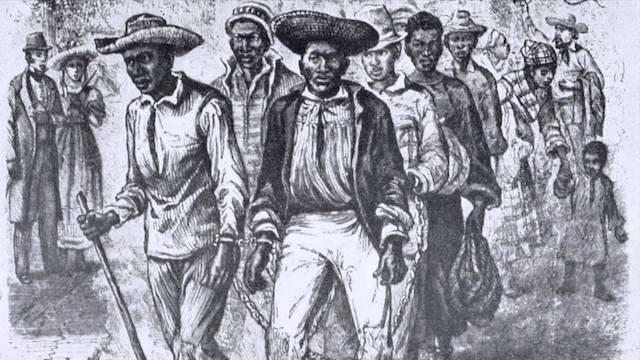US Congress Apologizes for Slavery
Washington, D.C.: “US Congress Apologizes for Slavery.”.
AfroAmerica Network. Baltimore, June 19, 2009.Whereas the legacy of African-Americans is interwoven with the very fabric of the democracy and freedom of the United States; (Ordered Held at Senate Desk after being Received from House )
SCON 26 HDS 111th CONGRESS 1st Session S. CON. RES. 26 Apologizing for the enslavement and racial segregation of African-Americans.
IN THE SENATE OF THE UNITED STATES
June 11, 2009Mr. HARKIN (for himself, Mr. BROWNBACK, Mr. LEVIN, Mr. DURBIN, Mr. KENNEDY, Mr. LAUTENBERG, Ms. STABENOW, Mr. BOND, and Mr. COCHRAN)
submitted the following concurrent resolution; which was ordered held at the desk
Apologizing for the enslavement and racial segregation of African-Americans.
- Whereas, during the history of the Nation, the United States has grown into a symbol of democracy and freedom around the world;
- Whereas the legacy of African-Americans is interwoven with the very fabric of the democracy and freedom of the United States;
- Whereas millions of Africans and their descendants were enslaved in the United States and the 13 American colonies from 1619 through 1865;
- Whereas Africans forced into slavery were brutalized, humiliated, dehumanized, and subjected to the indignity of being stripped of their names and heritage;
- Whereas many enslaved families were torn apart after family members were sold separately;
- Whereas the system of slavery and the visceral racism against people of African descent upon which it depended became enmeshed in the social fabric of the United States;
- Whereas slavery was not officially abolished until the ratification of the 13th amendment to the Constitution of the United States in 1865, after the end of the Civil War;
- Whereas after emancipation from 246 years of slavery, African-Americans soon saw the fleeting political, social, and economic gains they made during Reconstruction eviscerated by virulent racism, lynchings, disenfranchisement, Black Codes, and racial segregation laws that imposed a rigid system of officially sanctioned racial segregation in virtually all areas of life;
- Whereas the system of de jure racial segregation known as `Jim Crow', which arose in certain parts of the United States after the Civil War to create separate and unequal societies for Whites and African-Americans, was a direct result of the racism against people of African descent that was engendered by slavery;
- Whereas the system of Jim Crow laws officially existed until the 1960s--a century after the official end of slavery in the United States--until Congress took action to end it, but the vestiges of Jim Crow continue to this day;
- Whereas African-Americans continue to suffer from the consequences of slavery and Jim Crow laws--long after both systems were formally abolished--through enormous damage and loss, both tangible and intangible, including the loss of human dignity and liberty;
- Whereas the story of the enslavement and de jure segregation of African-Americans and the dehumanizing atrocities committed against them should not be purged from or minimized in the telling of the history of the United States;
- Whereas those African-Americans who suffered under slavery and Jim Crow laws, and their descendants, exemplify the strength of the human character and provide a model of courage, commitment, and perseverance;
- Whereas, on July 8, 2003, during a trip to Goree Island, Senegal, a former slave port, President George W. Bush acknowledged the continuing legacy of slavery in life in the United States and the need to confront that legacy, when he stated that slavery `was . . . one of the greatest crimes of history . . . The racial bigotry fed by slavery did not end with slavery or with segregation. And many of the issues that still trouble America have roots in the bitter experience of other times. But however long the journey, our destiny is set: liberty and justice for all.';
- Whereas President Bill Clinton also acknowledged the deep-seated problems caused by the continuing legacy of racism against African-Americans that began with slavery, when he initiated a national dialogue about race;
- Whereas an apology for centuries of brutal dehumanization and injustices cannot erase the past, but confession of the wrongs committed and a formal apology to African-Americans will help bind the wounds of the Nation that are rooted in slavery and can speed racial healing and reconciliation and help the people of the United States understand the past and honor the history of all people of the United States; Whereas the legislatures of the Commonwealth of Virginia and the States of Alabama, Florida, Maryland, and North Carolina have taken the lead in adopting resolutions officially expressing appropriate remorse for slavery, and other State legislatures are considering similar resolutions; and
- Whereas it is important for the people of the United States, who legally recognized slavery through the Constitution and the laws of the United States, to make a formal apology for slavery and for its successor, Jim Crow, so they can move forward and seek reconciliation, justice, and harmony for all people of the United States:
Now, therefore, be it
Resolved by the Senate (the House of Representatives concurring), That the sense of the Congress is the following:
(1) APOLOGY FOR THE ENSLAVEMENT AND SEGREGATION OF AFRICAN-AMERICANS-The Congress--
(A) acknowledges the fundamental injustice, cruelty, brutality, and inhumanity of slavery and Jim Crow laws;
(B) apologizes to African-Americans on behalf of the people of the United States, for the wrongs committed against them and their ancestors who suffered under slavery and Jim Crow laws; and
(C) expresses its recommitment to the principle that all people are created equal and endowed with inalienable rights to life, liberty, and the pursuit of happiness, and calls on all people of the United States to work toward eliminating racial prejudices, injustices, and discrimination from our society. (2) DISCLAIMER- Nothing in this resolution--
(A) authorizes or supports any claim against the United States; or
(B) serves as a settlement of any claim against the United States.















